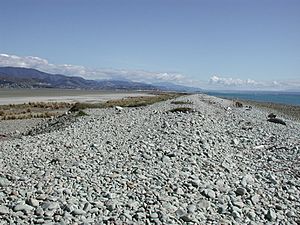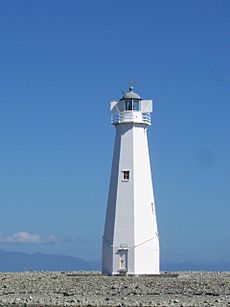Boulder Bank facts for kids
The Boulder Bank, also known as Te Pokohiwi, is a unique natural landform in Nelson, New Zealand. It's like a long, narrow wall of rocks, about 13 kilometres (8 miles) long. This rocky stretch starts at Mackay Bluff and goes all the way to a place called the Cut near the Nelson Harbour.
Haulashore Island used to be connected to the Boulder Bank. But when "the Cut" was made, it turned Haulashore into a separate island. The Boulder Bank acts like a natural barrier, separating Tasman Bay / Te Tai-o-Aorere from the calm waters of the Nelson Haven. The Department of Conservation looks after this special area as a scenic reserve. You can visit it by driving along Boulder Bank Drive, which is signposted off State Highway 6 at the northern end of Nelson Haven.
Contents
How the Boulder Bank Formed
The Boulder Bank is made up of a type of rock called granodiorite. This rock comes from Mackay Bluff, which is at one end of the bank. Scientists are still debating exactly how this unusual rock formation came to be.
The Longshore Drift Idea
The most popular idea is that the Boulder Bank was formed by a process called longshore drift. This is when waves and currents move sand and pebbles along the coastline. However, some people disagree because Tasman Bay / Te Tai-o-Aorere doesn't usually have strong enough waves to move such large boulders.
How Fast Do the Rocks Move?
Even though its formation is debated, studies have been done since 1892 to see how fast the boulders move. It's thought that the top layer of gravel on the bank moves about 7.5 metres (25 feet) every year.
The Cut: A Gateway for Ships
The Cut is a man-made channel that allows ships to enter and leave Nelson's port. It was created to help the port handle more ships and goods for the Tasman District.
Building the Cut
Work on The Cut began in 1903. By 1905, a 61-metre (200-foot) wide entrance was open for ships. Today, The Cut is much wider, at 150 metres (490 feet) across.
Keeping the Channel Deep
To make sure large ships can always pass through, The Cut is regularly dredged. This means that machines remove sand and mud from the bottom of the channel. It's dredged every six months to keep it at a depth of 10 metres (33 feet).
The Historic Lighthouse
The Boulder Bank Lighthouse stands proudly near the port end of the Boulder Bank. It was built in 1862 and was only the second permanent lighthouse ever built in New Zealand. This important building is officially recognized by Heritage New Zealand as a Category I historic structure.
See also
 In Spanish: Boulder Bank para niños
In Spanish: Boulder Bank para niños
 | Aaron Henry |
 | T. R. M. Howard |
 | Jesse Jackson |




